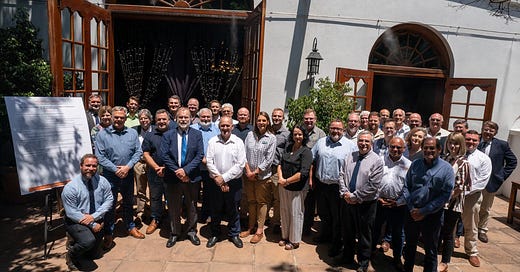BELA Act: A Turning Point for South Africa
Education law unveils historic turning point for the future of South Africa and the Afrikaner people
In a previous post here on Substack, I remarked that the Basic Education Laws Amendment Act (BELA) can lead to the government’s collapse in South Africa. This is because the former ruling party, the African National Congress (ANC), is now governing in coalition with several opposition parties that have declared this legislation as a red line that cannot be crossed.
The various institutions of the Solidarity Movement (including Solidarity and AfriForum) have called on the parties in coalition with the ANC to reconsider their participation in the so-called Government of National Unity (GNU), should the BELA Act be implemented in its entirety. These parties can hardly afford to refuse this call, as the members of the Solidarity Movement constitute the bulk of the voters for the Freedom Front Plus’s (FF Plus) party, and represent a significant percentage of voters of the Democratic Alliance (DA). Should these parties continue their participation in the GNU once the BELA Act is fully implemented, they will be significantly punished by their voters in the next election.
The contentious issues in the BELA Act are contained in sections 4 and 5, which will take away the authority of school governing bodies to determine their own language and admissions policies and hand those powers to the government. The Act has already been approved in the various legislative processes as a result of the ANC’s majority rule during its previous term (during the national election earlier this year, the ANC’s support has dropped from 58% to just over 40%). Therefore, BELA has already been signed by President Cyril Ramaphosa for implementation. As a direct result of pressure applied by the institutions of the Solidarity Movement, sections 4 and 5 were put on hold for three months to allow room for continued discussions about whether, or how, these sections ought to be implemented. The three months will come to an end in mid-December.
Today, more than 40 Afrikaans institutions (supporters, partners and friends of the Solidarity Movement) hosted a joint press conference to take a collective stance against the BELA Act. The combined message is that the BELA Act is an act of aggression aimed in particular against the Afrikaans language community and the Afrikaner cultural community.
The underlying motivation behind the implementation of this Act is an open secret. The ANC government has failed spectacularly to improve the quality of education in South Africa. Not only are the existing schools mostly dysfunctional, but there is also a drastic decline in public schools’ capacity. Over the last 14 years, the number of learners in South Africa has increased by 7,4%, while the number of public schools has decreased by 8,8%.
Furthermore, influential people in the party leadership harbor a deep-rooted hatred for the Afrikaans language and the people who speak it. And so, instead of fixing the more than 80% of schools in South Africa that are already dysfunctional, the ANC seeks to target the few functional schools (predominantly Afrikaans schools) under the banner of providing “access” to children.
Tomorrow, 5 November 2024 thousands of people will participate in a protest march from the Voortrekker Monument in Pretoria to Freedom Park to present a memorandum to the government against the BELA Act.
During my presentation at the abovementioned joint press conference, I remarked that this is a historic moment for both the South African government and the Afrikaner people. It is a historic moment for the ANC government because it could lead to the collapse of the GNU, while drastically accelerating the failures of the South African government. This is because the BELA Act has the potential to be the most destructive piece of legislation applied in South Africa since the ANC’s coming to power in 1994.
Furthermore, this is a historic moment for the Afrikaner community. There are common tropes among the Afrikaner people that “Afrikaners can’t stand together” and that “Afrikaners don’t have leaders”; yet today’s press conference and tomorrow’s march are indicative that these tropes have lost much of their credibility. The Afrikaner people can stand together, and our leadership is strong.
The energy released because of this attack on our children and our language is not only channeled into protest action but also into a renewed resolve to strengthen our institutions to ensure that we take ownership of our own future. Common sense and experience have shown that we cannot afford to leave our children’s future in the hands of a government that clearly does not have our best interests at heart.
—
The Afrikaner Foundation works to promote international cooperation with and support for the Afrikaner people, for the Afrikaner people to take up their rightful place in the international community once again, and to contribute with a particular focus on the preservation of the Western tradition.






Thank you for bringing this to the world's attention. My heart and my prayers go out to the Afrikaner. ❤️🙏🏻